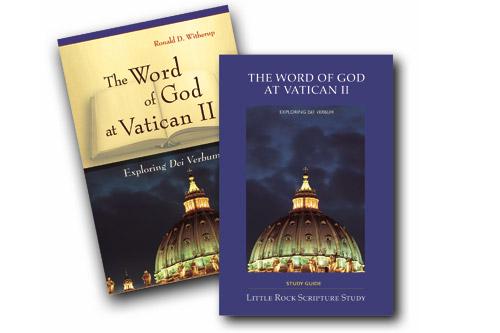
The Dogmatic Constitution on Divine Revelation, “Dei Verbum,” isn’t only a Vatican Council II document written for the Church 50 years ago. It is still relevant today and worth studying, said Little Rock Scripture Study director Cackie Upchurch.
“‘Dei Verbum’ offered a real opportunity for the Catholic in the pew to say, ‘This really is for me. This Bible does have something to say to me,’” she said of the embrace of Bible study over the past five decades.
LRSS will release a four-session study called “The Word of God at Vatican II” in June to coincide with two anniversaries. Next year will mark the 50th anniversary of “Dei Verbum” and this year is the 40th anniversary of LRSS, making it the oldest Catholic Bible study program in the United States. LRSS was founded in the Diocese of Little Rock as a response to the Vatican Council document.
“We want these next couple of years to highlight the Church’s appreciation for and use of the Bible and how significant it is in our personal lives,” she said.
The study includes a commentary written by Father Ron Witherup, SS, a well-known Scripture scholar and superior general of the Sulpicians in Paris, France, and a study set and answer guide written by Upchurch. No video wrap-up lectures accompany this study, Upchurch said. She said this short study could be used with the usual Bible study groups as well as in classrooms, with groups of lay ministers such as lectors and with individuals.
It was in 1943 with the papal encyclical “Divino Afflante Spiritu” (“Inspired by the Holy Spirit”) that scholarly methods of studying the Bible were promoted, and it set the tone for publication of “Dei Verbum” on Nov. 6, 1965.
Before 1965, “there wasn’t anything out there for Catholics to use to actually pick up a Bible and study and pray with it and figure out what it was saying originally and why it is still important. There wasn’t anything that helped us see it as more than historically inspiring … A lot of Catholics were looking for that and were hungry for that, but they found it in another denomination’s or interdenominational materials. That is fine, but there is no reason we shouldn’t be doing that ourselves and bringing our Catholic understanding of God’s work in the world.”
When Upchurch was growing up in Fort Smith in the 1960s, she remembers that “Bible history” was taught, but it was mainly the retelling of famous “stories” like Moses and Jacob.
“We didn’t learn it directly from the Bible, but it was more from the retelling of the stories. … It was a great start, but it is not enough for our adult faith,” she said.
With the release of “Dei Verbum,” the Church slowly began to see that Scripture study could be undertaken by lay Catholics and encouraged them to respond to the Scriptures in a personal way. Sermons during Mass also changed.
“After the Second Vatican Council, the preaching that happened in our parishes focused more on the Word of God. … (Prior to 1965 the homilies) didn’t have to relate to the Scriptures themselves. They really weren’t breaking open the Scriptures in a way to help us see the connections between the Scriptures and our teachings. … (With “Dei Verbum”) it gave people around the world the opportunity to see that the Bible could be understood on many levels, containing many layers of meaning.”
Father Witherup wrote in the commentary, “Although it was one of the last documents of the council to be approved and promulgated, “Dei Verbum” was one that began to have virtually an immediate impact on Catholic life. … Little Rock Scripture Study ... is one example of the kind of high-quality Bible study programs that began to make inroads among Catholics in order to promote better understanding of the sacred Scriptures.”
While LRSS is encouraging Catholics to understand the Bible better, Father Witherup cautioned against using the Scriptures as weapons to fight with other Christians.
“We have an obligation to defend the faith, but in ways that are consistent with the Gospel message and the example of Jesus himself,” he wrote. “As the temptation stories in Matthew and Luke show, even the devil can quote Scripture (Matthew 4:1-11; Luke 4:1-13). Throwing Scripture back and forth at one another will achieve nothing (unless you are Jesus!).”
LRSS materials can be ordered by calling (501) 664-6102, or by clicking here.
Please read our Comments Policy before posting.
Article comments powered by Disqus Studio 3:16 offers new approach to teaching religion
Studio 3:16 offers new approach to teaching religion
 After three decades, NLR principal plans to retire
After three decades, NLR principal plans to retire
 CHS athlete overcomes odds to reach collegiate goal
CHS athlete overcomes odds to reach collegiate goal
 John Calipari: UA basketball coach and devout Catholic
John Calipari: UA basketball coach and devout Catholic
 'Cabrini' film tells story of saint with great faith
'Cabrini' film tells story of saint with great faith
 St. Joseph a model of solidarity with immigrants
St. Joseph a model of solidarity with immigrants
 Two gifts after Jesus’ death: Virgin Mary and Eucharist
Two gifts after Jesus’ death: Virgin Mary and Eucharist
 Why we have an altar, and not just a communion table
Why we have an altar, and not just a communion table
 Pope: Wars should be resolved through nonviolence
Pope: Wars should be resolved through nonviolence
 Living relationship with Jesus Christ in the Eucharist
Living relationship with Jesus Christ in the Eucharist